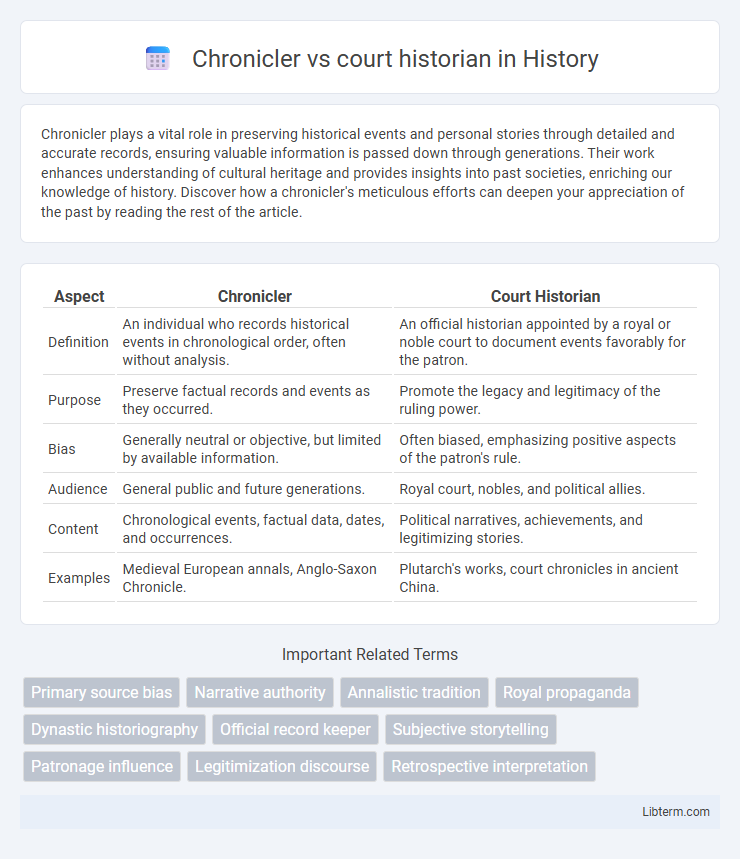Chronicler plays a vital role in preserving historical events and personal stories through detailed and accurate records, ensuring valuable information is passed down through generations. Their work enhances understanding of cultural heritage and provides insights into past societies, enriching our knowledge of history. Discover how a chronicler's meticulous efforts can deepen your appreciation of the past by reading the rest of the article.
Table of Comparison
| Aspect | Chronicler | Court Historian |
|---|---|---|
| Definition | An individual who records historical events in chronological order, often without analysis. | An official historian appointed by a royal or noble court to document events favorably for the patron. |
| Purpose | Preserve factual records and events as they occurred. | Promote the legacy and legitimacy of the ruling power. |
| Bias | Generally neutral or objective, but limited by available information. | Often biased, emphasizing positive aspects of the patron's rule. |
| Audience | General public and future generations. | Royal court, nobles, and political allies. |
| Content | Chronological events, factual data, dates, and occurrences. | Political narratives, achievements, and legitimizing stories. |
| Examples | Medieval European annals, Anglo-Saxon Chronicle. | Plutarch's works, court chronicles in ancient China. |
Understanding the Role: Chronicler vs Court Historian
Chroniclers documented events as they occurred, providing detailed, often firsthand accounts that aimed to preserve a factual record of historical happenings. Court historians, employed by royalty or noble patrons, produced narratives emphasizing the legitimacy and achievements of their benefactors, often blending history with political propaganda. Understanding the role differences highlights how chroniclers prioritize accuracy and breadth, while court historians focus on crafting a favorable legacy for their rulers.
Origins and Historical Contexts
Chroniclers and court historians emerged in distinct historical contexts, with chroniclers often originating in medieval monasteries where monks preserved annals and local events using straightforward narrative methods. Court historians developed later within royal or noble courts, tasked with producing official histories that reinforced the legitimacy and power of rulers through carefully curated accounts. The evolution from anonymous chronicling to institutionalized court historiography reflects shifting needs from communal memory preservation to political propaganda and statecraft.
Sources and Methodologies
Chroniclers relied primarily on eyewitness accounts, oral traditions, and local records to document events, emphasizing a narrative style focused on continuity and comprehensiveness. Court historians had access to official documents, royal archives, and state communications, enabling a more authoritative and polished historiography often influenced by political agendas. Methodologically, chroniclers employed a chronological, descriptive approach, whereas court historians integrated analytical and interpretative techniques to legitimize rulership and shape public memory.
Purpose and Audience
Chroniclers primarily aimed to record events in a straightforward, year-by-year format for a general audience seeking factual historical accounts. Court historians, often commissioned by ruling elites, crafted narratives to legitimize and glorify their patrons' reigns, targeting nobility and political figures. The purpose of chroniclers emphasized objectivity and preservation of facts, while court historians focused on persuasion and reinforcing political power.
Narrative Style and Objectivity
Chroniclers employ a straightforward, often chronological narrative style that emphasizes factual recording of events without interpretation or embellishment, prioritizing objectivity to maintain a reliable historical account. Court historians, in contrast, use a more crafted and rhetorical narrative style designed to glorify their patrons or regime, which can introduce bias and reduce objective impartiality. The chronicler's work serves as a primary source document, whereas the court historian's narrative often functions as political propaganda or legitimization.
Influence of Patronage and Power
Chroniclers often depended on the patronage of religious institutions or local elites, which shaped their narratives to reflect the values and interests of these sponsors, emphasizing moral lessons or divine intervention. Court historians operated within royal or noble courts, producing records that reinforced the legitimacy and prestige of their patrons, often glossing over unfavorable events to maintain favor and political power. Patronage significantly influenced both roles, as chroniclers aimed to uphold communal or religious ideals while court historians prioritized propagandist accounts serving dynastic authority.
Authenticity and Bias
Chroniclers often provide firsthand accounts rooted in local or contemporary observations, enhancing the authenticity of historical narratives, but their proximity can introduce personal or cultural bias. Court historians, appointed by ruling elites, typically present history that favors the interests and legitimacy of their patrons, which may compromise impartiality while reinforcing official perspectives. Evaluating both roles requires careful consideration of source context to balance authenticity against potential bias in historical records.
Impact on Historical Record
Chroniclers often provided detailed, year-by-year accounts of events, focusing on local occurrences and social conditions, which contributed richly to the historical record by preserving everyday life and cultural contexts. Court historians, employed by monarchs or rulers, tended to produce official narratives that emphasized the achievements and legitimacy of their patrons, potentially introducing bias but also offering valuable insights into political ideologies and statecraft. Together, their works create a complementary historical record that balances grassroots perspectives with authoritative interpretations, shaping modern understanding of past societies.
Notable Chroniclers and Court Historians
Notable chroniclers such as Jean Froissart and Matthew Paris provided detailed, often first-hand accounts of medieval events, emphasizing narrative and local perspectives. Court historians like Plutarch and Tacitus, by contrast, were officially appointed to document history with an emphasis on state affairs, political analysis, and legitimizing ruling powers. Both roles significantly shaped historical records, with chroniclers offering grassroots insights and court historians ensuring authoritative documentation aligned with ruling agendas.
Relevance in Modern Historiography
Chroniclers provide detailed, year-by-year accounts of events, offering primary source material crucial for reconstructing historical timelines, while court historians often present curated narratives that reflect the political and ideological agendas of ruling elites. The relevance in modern historiography lies in balancing these perspectives to achieve a nuanced understanding of the past, integrating the factual granularity of chroniclers with the contextual interpretations of court historians. This synthesis enhances critical analysis, allowing historians to discern bias, validate sources, and construct comprehensive historical frameworks.
Chronicler Infographic

 libterm.com
libterm.com